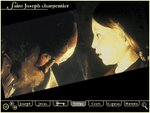Marc-Antoine Charpentier
( 1643 -1704 )
« Je suis celui, qui né naguère, fut connu dans le siècle ; me voici, mort, nu et nul au sépulcre, poussière, cendres et nourriture pour les vers. J’ai assez vécu mais trop peu en regard de l’éternité [...]. J’étais musicien, considéré comme bon parmi les bons et ignare parmi les ignares. Et comme le nombre de ceux qui me méprisaient était beaucoup plus grand que le nombre de ceux qui me louaient, la musique me fut de peu d’honneur mais de grande charge ; et, de même qu’en naissant, je n’ai rien apporté en ce monde, en mourant, je n’ai rien emporté... ».
Ainsi se présentait Charpentier dans son étonnante pièce en latin intitulée Epitaphium Carpentarii dans laquelle il se met lui-même en scène : il imagine qu’il revient sur terre après sa mort, sous l’aspect d’une ombre, et se penche sur sa vie avec un curieux mélange d’humilité et d’amertume.
On peut dire que trois siècles plus tard, Charpentier a pris une sorte de revanche. Ainsi, aujourd’hui, il est le compositeur français de l’époque baroque le plus présent au disque. Depuis les années 1950, son œuvre monumentale qui compte plus de 550 numéros a été enregistrée pour plus de la moitié. Cette diffusion, tout à fait exceptionnelle, a permis de reconsidérer la place de Charpentier dans le paysage musical occidental. Pourtant, l’homme garde toujours son mystère et, malgré d’importantes études (notamment celles de Patricia M. Ranum), il est difficile de savoir exactement qui il était, comment il a vécu, quelle était la nature de ses relations avec ses contemporains, les musiciens et les autres. Seule, son épitaphe laisse percevoir les sentiments qui pouvaient être les siens à un moment de sa vie, probablement peu de temps avant son arrivée à la Sainte-Chapelle en 1698, c’est-à-dire après avoir réalisé l’essentiel de sa carrière et supporté maints tourments.
D'après Goldberg Magazine
“I am he who, born in another time, was known during the century; here I am, dead, naked and nobody, in the tomb, dust, cinders and food for the worms. I lived enough but too little in relation to eternity [...]. I was a musician, considered good among the good and ignorant among the ignorant. And as the number of those who despised me was much larger than the number of those who praised me, music was of little honour to me but a great burden; and, as when I was born, I brought nothing into this world, in dying, I took nothing with me...”
Thus does Charpentier introduce himself in his astonishing piece in Latin entitled Epitaphium Carpentarii, in which he himself appears on the stage: he imagines that he returns to earth after his death, in the guise of a shade, and looks over his life with a curious mixture of humility and bitterness.
One might say that three centuries later, Charpentier has taken a kind of revenge. Today, he is the most recorded French composer of the baroque period on disc. Since the 1950s, of his monumental output, which includes more than 550 works, more than half has been recorded. This circulation, quite exceptional, has allowed a reconsideration of Charpentier’s place within the western musical landscape. However, the man still retains his mystery and, in spite of some important studies (notably those by Patricia M. Ranum), it is difficult to know exactly who he was, how he lived, what was the nature of his relationships with his contemporaries, musicians and others. Only his epitaph allows one to perceive the feelings which could have been his at a particular time of his life, probably shortly after his arrival at the Sainte-Chapelle in 1698, that is, after having completed the greater part of his career and suffered many torments.
Thus does Charpentier introduce himself in his astonishing piece in Latin entitled Epitaphium Carpentarii, in which he himself appears on the stage: he imagines that he returns to earth after his death, in the guise of a shade, and looks over his life with a curious mixture of humility and bitterness.
One might say that three centuries later, Charpentier has taken a kind of revenge. Today, he is the most recorded French composer of the baroque period on disc. Since the 1950s, of his monumental output, which includes more than 550 works, more than half has been recorded. This circulation, quite exceptional, has allowed a reconsideration of Charpentier’s place within the western musical landscape. However, the man still retains his mystery and, in spite of some important studies (notably those by Patricia M. Ranum), it is difficult to know exactly who he was, how he lived, what was the nature of his relationships with his contemporaries, musicians and others. Only his epitaph allows one to perceive the feelings which could have been his at a particular time of his life, probably shortly after his arrival at the Sainte-Chapelle in 1698, that is, after having completed the greater part of his career and suffered many torments.
From the Goldberg Magazine
Live Recording of Marc-Antoine Charpentier's Magnificat for 3 voices.
Jay Carter, countertenor
Daniel Mutlu, tenor
Wesley Chinn, Bass



2 commentaires:
Deo Gratias~~~~~~~~This soothes my soul and does my heart good. Thank you Abbe. This blog is one of my favourites.:)
SPB
très beau !
Enregistrer un commentaire